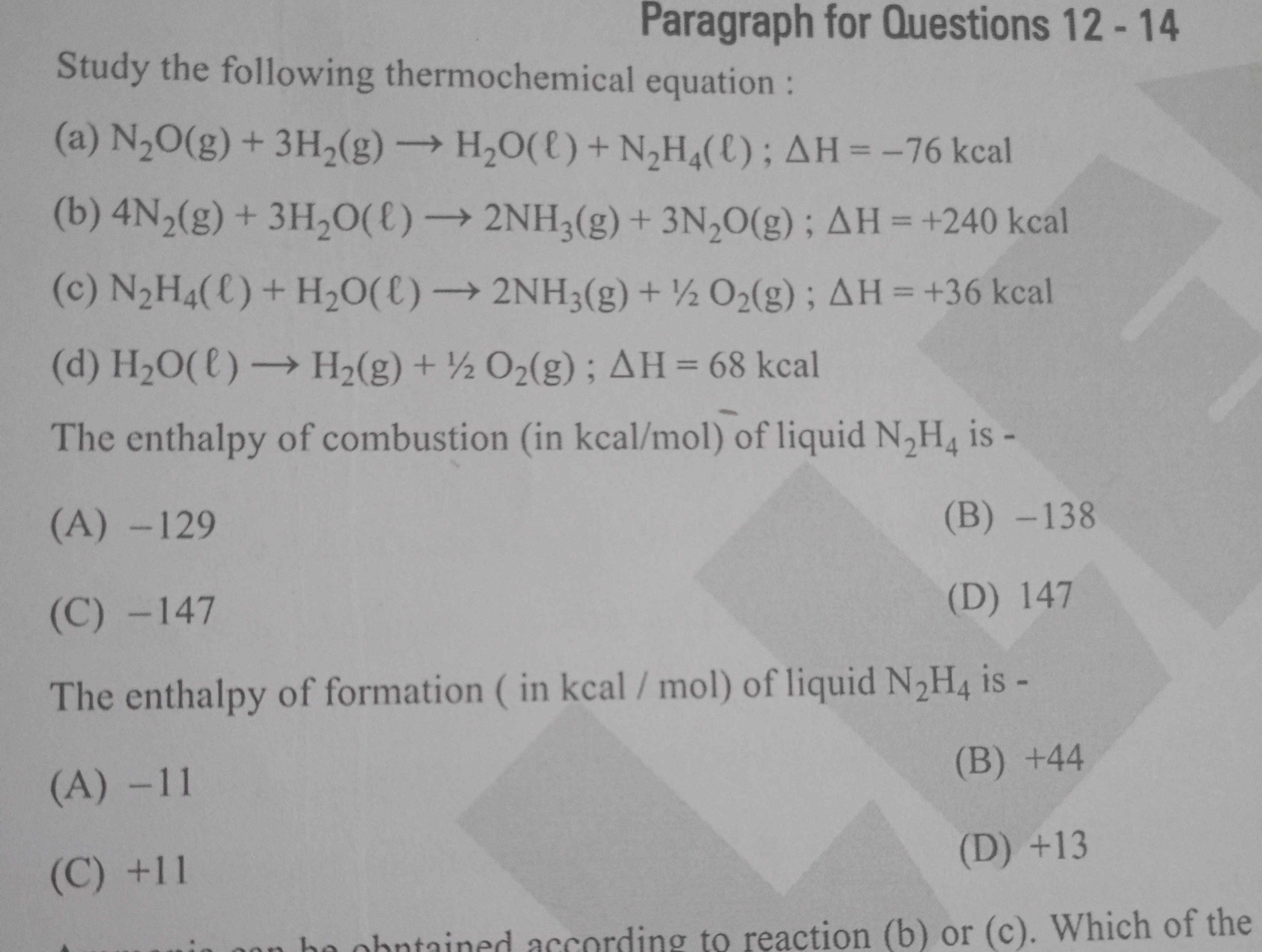Question
Question: Paragraph for Questions 12 - 14 Study the following thermochemical equation : N₂O(g) + 3H₂(g) → H₂O...
Paragraph for Questions 12 - 14 Study the following thermochemical equation :
N₂O(g) + 3H₂(g) → H₂O(l) + N₂H₄(l); ∆H = -76 kcal
4N₂(g) + 3H₂O(l) → 2NH₃(g) + 3N₂O(g) ; ∆H = +240 kcal
N₂H₄(l) + H₂O(l) → 2NH₃(g) + ½ O₂(g); ∆H = +36 kcal
H₂O(l) → H₂(g) + ½ O₂(g); ∆H = 68 kcal
The enthalpy of combustion (in kcal/mol) of liquid N₂H₄ is -

-129
-138
-147
147
-147 kcal/mol
Solution
Let the enthalpies of formation of N₂O(g), NH₃(g), and N₂H₄(l) be y, x, and z kcal/mol respectively. The enthalpy of formation of H₂O(l) is w kcal/mol, and for elements in their standard state (N₂(g), H₂(g), O₂(g)) it is 0. From reaction (d), H₂O(l) → H₂(g) + ½ O₂(g); ∆H = 68 kcal. 0 + 0 - w = 68 => w = -68 kcal/mol. So, ∆H_f(H₂O, l) = -68 kcal/mol.
Write the given reactions in terms of enthalpies of formation: (a) N₂O(g) + 3H₂(g) → H₂O(l) + N₂H₄(l); ∆H = -76 ∆H_f(H₂O) + ∆H_f(N₂H₄) - ∆H_f(N₂O) - 3∆H_f(H₂) = -76 w + z - y - 3(0) = -76 => -68 + z - y = -76 => z - y = -8 (Eq 1)
(b) 4N₂(g) + 3H₂O(l) → 2NH₃(g) + 3N₂O(g); ∆H = +240 2∆H_f(NH₃) + 3∆H_f(N₂O) - 4∆H_f(N₂) - 3∆H_f(H₂O) = +240 2x + 3y - 4(0) - 3w = +240 => 2x + 3y - 3(-68) = 240 => 2x + 3y + 204 = 240 => 2x + 3y = 36 (Eq 2)
(c) N₂H₄(l) + H₂O(l) → 2NH₃(g) + ½ O₂(g); ∆H = +36 2∆H_f(NH₃) + ½ ∆H_f(O₂) - ∆H_f(N₂H₄) - ∆H_f(H₂O) = +36 2x + ½ (0) - z - w = +36 => 2x - z - (-68) = 36 => 2x - z + 68 = 36 => 2x - z = -32 (Eq 3)
We have a system of three linear equations with three unknowns (x, y, z):
- z - y = -8
- 2x + 3y = 36
- 2x - z = -32
From (1), z = y - 8. Substitute z in (3): 2x - (y - 8) = -32 => 2x - y + 8 = -32 => 2x - y = -40 (Eq 4)
Now solve the system of (2) and (4) for x and y: 2) 2x + 3y = 36 4) 2x - y = -40 Subtract (4) from (2): (2x + 3y) - (2x - y) = 36 - (-40) => 4y = 76 => y = 19.
Substitute y = 19 into (4): 2x - 19 = -40 => 2x = -21 => x = -10.5.
Substitute y = 19 into (1): z - 19 = -8 => z = 19 - 8 => z = 11.
So, ∆H_f(N₂O, g) = 19 kcal/mol, ∆H_f(NH₃, g) = -10.5 kcal/mol, ∆H_f(N₂H₄, l) = 11 kcal/mol.
Enthalpy of combustion of liquid N₂H₄: N₂H₄(l) + O₂(g) → N₂(g) + 2H₂O(l) ∆H_comb = Σ ∆H_f(products) - Σ ∆H_f(reactants) ∆H_comb = [∆H_f(N₂, g) + 2 * ∆H_f(H₂O, l)] - [∆H_f(N₂H₄, l) + ∆H_f(O₂, g)] ∆H_comb = [0 + 2 * (-68)] - [11 + 0] ∆H_comb = -136 - 11 = -147 kcal/mol.
The enthalpy of formation of liquid N₂H₄ is +11 kcal/mol.
The enthalpy of combustion is -147 kcal/mol, which matches option (C) in the first set of options. The enthalpy of formation is +11 kcal/mol, which matches option (C) in the second set of options.
